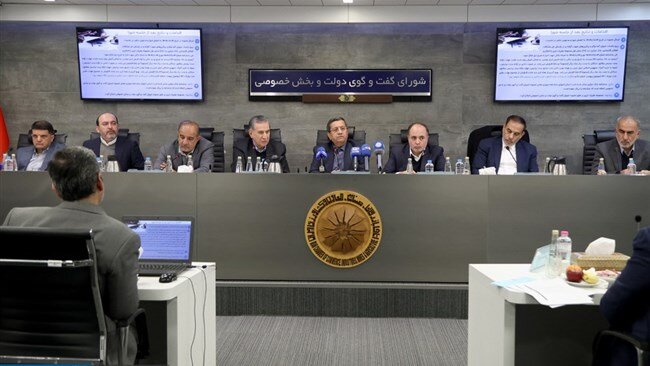Recent economic issues discussed at 129th governmentprivate sector dialogue meeting
Recent economic issues discussed at 129th government-private sector dialogue meeting
TEHRAN – Iran’s economy minister announced the finalization of the pricing mechanism for explosives used in mines during the 129th session of the Government-Private Sector Dialogue Council, held on Monday night at the Iran Chamber of Commerce, Industries, Mines, and Agriculture (ICCIMA).

The meeting, chaired by Economy Minister Abdolnasser Hemmati, Agriculture Minister Nouri Ghezeljeh, and ICCIMA Head Samad Hassanzadeh, also addressed ambiguities in the approval process for pricing and distribution of essential goods.
It was decided that the Central Bank of Iran (CBI) would cancel the requirement for case-by-case approvals and instead recognize the Agriculture Ministry’s certification of goods entering the domestic market.
Additionally, the council followed up on a resolution from its 126th session regarding an extension for importers in cases where delays in clearing goods are beyond their control. The resolution was reaffirmed, with customs authorities responsible for monitoring its implementation.
Another key issue discussed was the proposed extension of debt repayment deadlines for borrowers from the Foreign Exchange Reserve Account under Article 20 of the Law on Removing Production Barriers. The council agreed to form a working group with Economy Ministry representatives to review and finalize the proposal.
The session also addressed challenges in foreign currency allocation for pharmaceuticals and raw materials, as well as the need for a structured approach to ensure funding for inspection companies. It was agreed that further specialized meetings with representatives from the Planning and Budget Organization and the Central Bank would be held.
At the beginning of the session, concerns were raised over inconsistencies in essential goods pricing. According to private sector representatives, after the removal of preferential exchange rates, these goods were imported at the higher ETS rate, yet no compensation mechanism was provided to mitigate the impact on businesses. Moreover, importers are now forced to wait in long queues for currency allocation, even after bringing goods into the country with their own capital.
The business community also criticized the Central Bank’s directive issued on March 13, 2024, which ties foreign exchange obligations to selling goods at regulated prices through the Agriculture Ministry’s distribution network (Bazargah system). They argued that requiring the ministry to include binding clauses in Form 14—beyond its legal responsibilities—has disrupted supply chains, leaving imported goods stockpiled for up to eight months.
Arsalan Ghasemi, a representative of the Iran Chamber of Cooperatives and a council member, criticized the Central Bank’s interference in trade policy, arguing that while the bank is responsible for monetary policy, it should not dictate commercial regulations.
EF/MA
source: tehrantimes.com